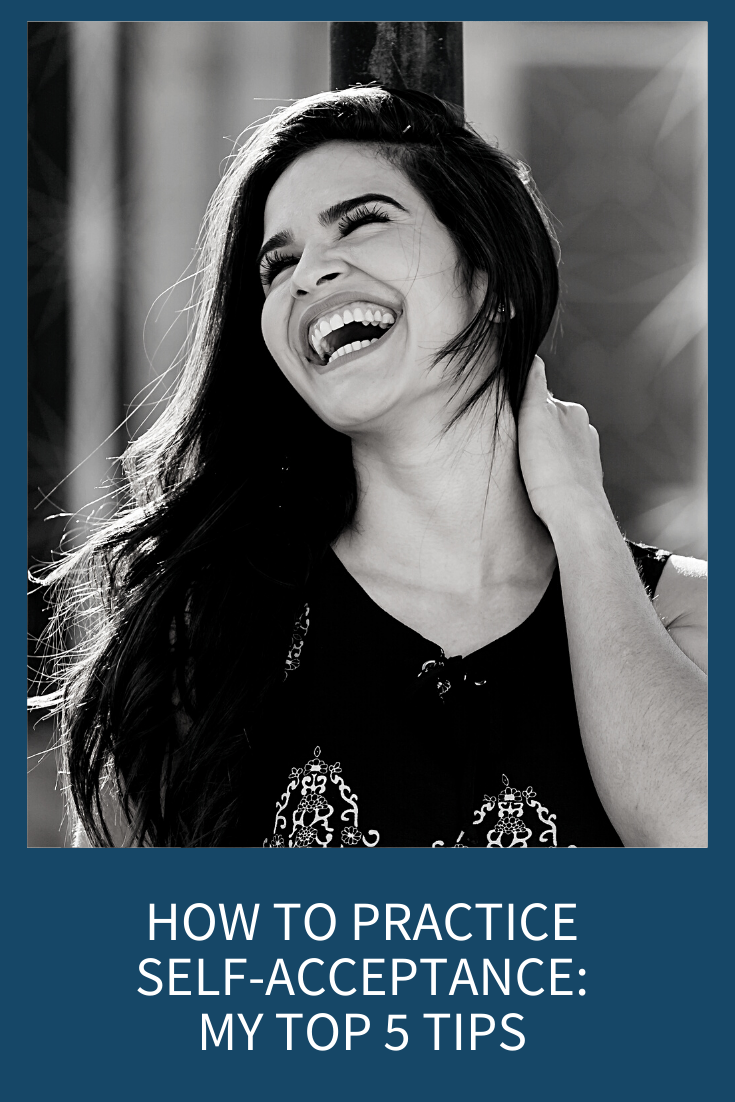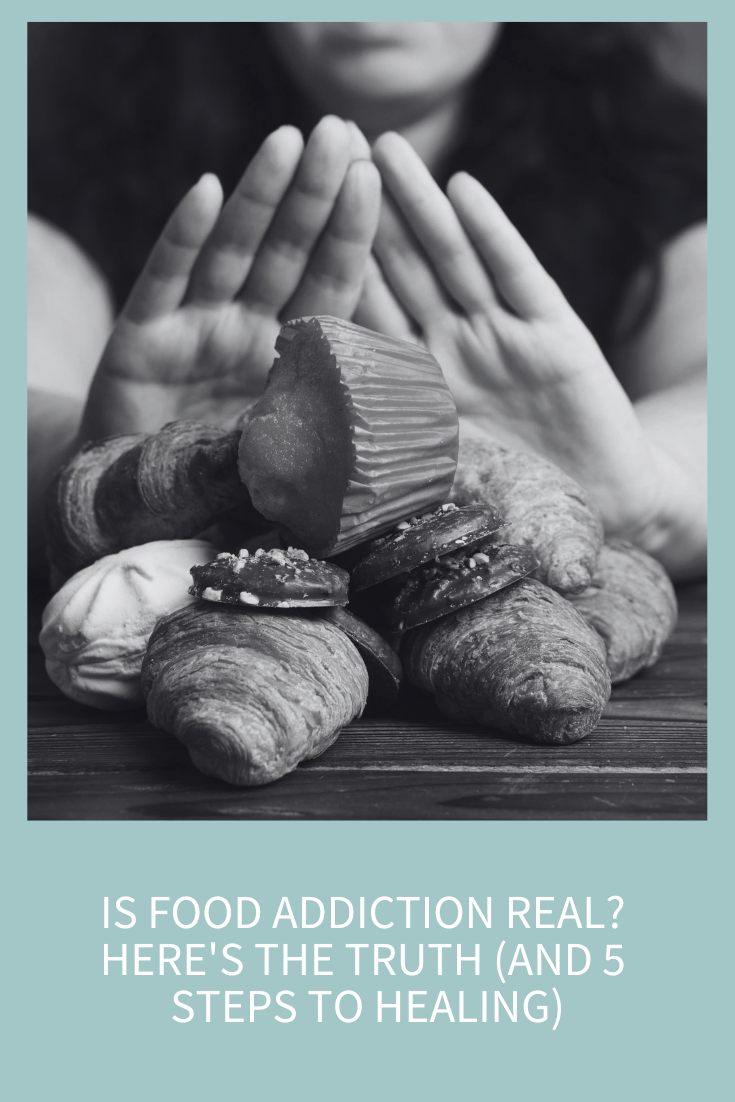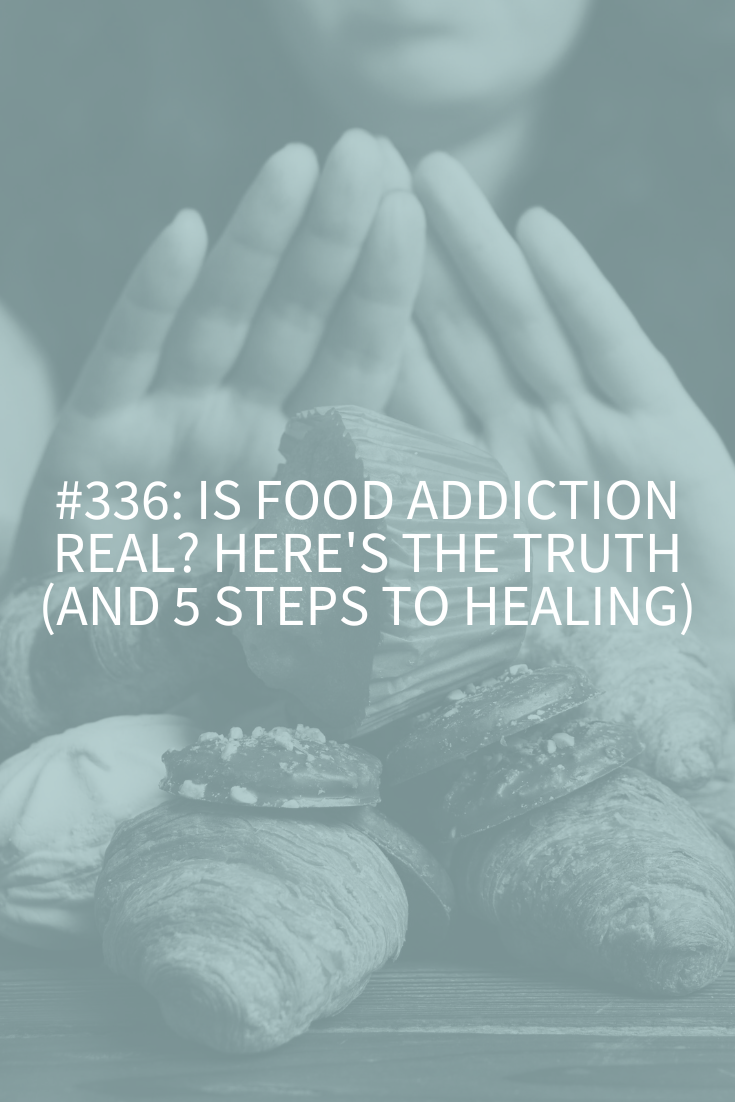
Whether you call it self-love, self-approval or self-compassion the research shows that learning to accept yourself is one of the keys to emotional well-being and happiness. Today you’ll learn why it’s so darn hard to accept yourself and how to practice self-acceptance right now.
8-minute read
What is self-acceptance? Practicing self-acceptance means you accept (and even embrace) all the parts of yourself, unconditionally. The good, the bad, the ugly and the beautiful. On its face, it seems like it shouldn’t be that hard but it’s something all my clients struggle with in some way so it definitely felt like it was time to chat about how to practice self-acceptance in detail.
Self-Acceptance vs. Self-Esteem
Let’s first talk about the difference between self-acceptance and self-esteem. These terms are different even though they’re closely related, because you’ve got to focus on self-acceptance if you want to raise your self-esteem. Self-esteem is how you think about yourself. Do you think you’re a good person who has value in the world? Self-acceptance is all about acknowledgment and acceptance of everything you are, warts and all. When you’re practicing self-acceptance, you’re not just looking at the good parts as you do with self-esteem. You’re seeing and embracing, in some way, all of you.
When you practice self-acceptance you accept your body, your thoughts and feelings, as well as what others may or may not think. It doesn’t mean you don’t want to improve areas of your life, but it means you’re also OK where you are right now.
People often make the mistake of trying to improve their self-acceptance through some achievement or success but this only temporarily helps your self-esteem. As soon as the hit of the finished project is over, you’re right back where you started.
I can’t remember where I read this (so forgive my non-credit) but you can think of the difference this way: self-esteem is the quality of fuel you use and self-acceptance is how you drive on that tank of fuel.
How Low Self-Esteem and Low Self-Acceptance Affect Your Mental Health
When you think bad thoughts about yourself, you literally change the real estate of your brain. Studies show that when you feel negatively about yourself, the regions in your brain that help you control your stress levels and emotions have less grey matter than people with higher self-acceptance. Why do you care about less grey matter in these regions of your brain? Because grey matter is what helps you control all your processes from how you move to what you remember to processing and controlling your emotions. Less grey matter means your brain can’t do its job well and you’ll have issues trying to cope with your stress and anxiety.
This becomes a nasty catch-22 because when you can’t control your stress and anxiety, well, this sends out more stress signals in your brain and now your brain thinks something little is really big. Now your brain isn’t even remembering what happened correctly or storing the memory as it really was. Instead, everything seems bad and is going to worse and this cycle then makes your brain think there’s more to worry about and it just goes to crazy town from there.
So, let’s say you’re worried about how you’re performing at work. As you constantly feel stress and anxiety about your job, you’re essentially eroding this grey matter in your brain making it unable to function properly (like telling you not to worry so much since you just received a great review). Instead, it keeps the alarm bells ringing and now you’re even more worried about your job! Your wonderful prefrontal cortex doesn’t rationally come on line to tell you how crazy you’re being and calm you down. Instead, you spin on this worry and that makes your brain think it should be more worried and sends out signals to get even more upset! YIKES!
Now you have, literally, damaged your brain due to your lack of self-acceptance. Then, when you try to use a tool to think or feel better it either doesn’t work or doesn’t work as well as it could. Again, another catch-22. Ok, now how to practice self-acceptance…
How to Practice Self-Acceptance: 5 Tips
Tip No. 1: Stop Comparing Yourself to Others
Mark Twain famously said, “comparison is the death of joy,” and he’s backed by studies. We’ve now got a bunch of research showing that comparing yourself to others diminishes your self-confidence while making you more depressed and anxious.
Whether you’re watching Keeping Up with the Kardashians, scrolling incessantly through social media, or talking to the other moms and wondering how they seem so together, it’s killing you and you’ve got to stop.
Tip No. 2: Keep Your Word to Yourself
When we don’t accept ourselves, we end up full of self-doubt. This results in changing our minds often, valuing others’ opinions more than our own and waffling. A way out of this cycle is to keep every commitment you make to yourself. If you start a home project but get halfway through and decide you don’t like the paint color, just finish the job as is. You can always change it another time. There was a reason you picked that color initially; just let that be enough.
Did you tell your friends you were going out on Saturday with them but now you feel too fat and don’t want to be seen in public? Put on your big girl pants (even if that’s literal) and get your gorgeous ass out the door.
Whenever you notice yourself doubting a decision you’ve made, or not making a decision because you’re full of doubt about your judgment, stop, breathe and see this for what it is: an opportunity for self-acceptance. You might mess it up. You might wish you’d painted the room green later, but it’s all about practicing this acceptance of all your decisions and starting to see that they’re all “right” in the moment.
Try it for one month and you’ll see a huge difference in how you feel!
Does that negative voice in your head never shut up? Learn my top five tips to silence your inner critic!
Tip No. 3: Forgive Yourself
We’ve all acted in ways we regret. Maybe you hurt someone you love, dropped out of school, stole, cheated or any number of things that you look back on and wonder, “What was I thinking?!” You beat yourself up or feel ashamed.
It might be true that you did a bad thing or made a stupid decision but that’s not the right question to ask yourself. Instead of asking if what you’re thinking is true, ask yourself if it’s helpful. Is it helpful to think about this thing or judge yourself? I mean, you can’t go back and change anything and I’m assuming you’ve learned something from the experience, so now what?
Forgiving yourself doesn’t mean you’re settling or condoning what you might have done in the past. It means you take responsibility, accept that it’s happened, and find a way to move forward. This will set you on the path to how to practice self-acceptance.
Having trouble learning to forgive yourself or someone else? My Forgiveness Master Class teaches you the five-step process, backed by research, to learn how to forgive.
Tip No. 4: Be Mindful
You didn’t think you’d get away that easily, did you? Of course, I’m going to tell you how being mindful is one of the best things you can do if you’re trying to practice self-acceptance.
When you’re in your present moment, you’ll notice that you’re scrolling through Instagram envying others and turn your attention to something that feels better. When you’re mindful, you’ll notice that inner critic in your head and be able to use your tools to quiet that voice. When you have present moment awareness, you’ll notice that you’re feeling self-conscious and self-critical standing next to your best friend who always looks so put together and be able to see your own beauty instead.
Tip No. 5: Find Your Self-Compassion
Why are we so mean to ourselves? Where’s the grace we offer others so readily? Where’s the patience we show our friends or kids? In other words, why aren’t we showing the compassion we give to others to ourselves?
Self-compassion is a construct originally drawn from Buddhist psychology. The Buddhists basically saw it as relating to yourself with kindness and compassion. The reigning queen of compassion, psychologist, Kristin Neff, was the first person to operationally define the term “self-compassion” so we could measure and study it.
Neff says, “Self-compassion is about relating to ourselves kindly, as we are, flaws and all.” When you’re self-compassionate, you’re able to see the difference between making a bad decision and being a bad person. You understand that your worth is not conditional on a situation, something you said, or thoughts you might have.
You can see how the definitions of self-acceptance and self-compassion are super similar and how practicing self-compassion will definitely help you with your self-acceptance!
Listen to my Loving Kindness Guided Meditation every day for one week to help you learn how to have more self-compassion!
Wrap Up: You’re Doing the Best with the Tools You Have
The real key to self-acceptance is getting over the self-doubt, as I mentioned earlier. Somehow, some way, you need to understand that you’re doing the best you can with the tools you have and that this has always been true.
So, when you made the decision to major in philosophy in college and now you regret it because you can’t find a job with your philosophy degree, don’t beat yourself up. When you made that choice back in the day, you were doing the best you could with the tools you had at that time.
Today, you’ve got new tools, so you’re able to think differently and make different choices. Don’t just accept yourself as you are, accept yourself as you were. The past is to learn from, not to live in.
Start accepting and trusting yourself now. Remember, that like any other relationship, it takes time to build trust so be patient and kind to yourself in the process.
Resources
8 Ways to Build Your Confidence and Self-Esteem
The Real Reason You Have Negative Thoughts (and 2 Things You Can Do About It)
Overcoming Insecurity and Silencing Your Inner Critic
Regret Sucks: The 3-Step Process to Make It Stop
How 5 Minutes of Mindfulness a Day Can Make Your Relationship Great
Is Self-Compassion the Secret to a Happy Relationship?








